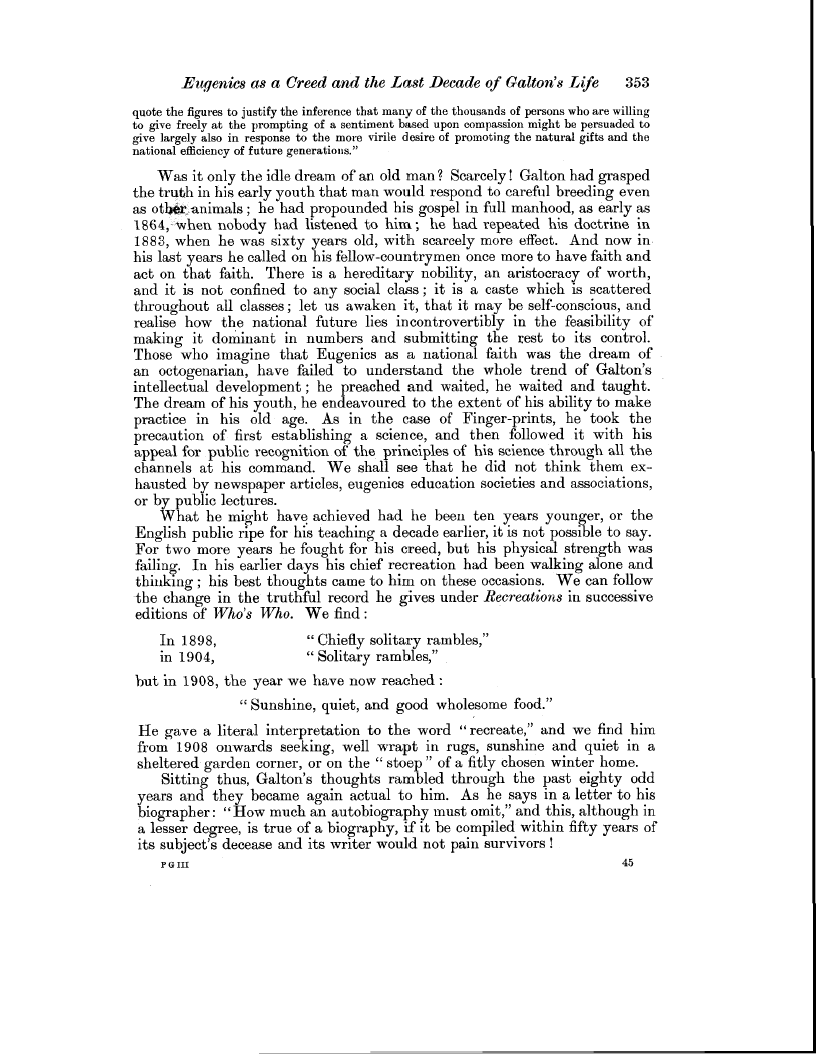| ||||||

OCR Rendition - approximate
Eugenics as a Creed and the Last Decade of Galton's Life 353 quote the figures to justify the inference that many of the thousands of persons who are willing to give freely at the prompting of a sentiment based upon compassion might be persuaded to give largely also in response to the more virile desire of promoting the natural gifts and the national efficiency of future generations." Was it only the idle dream of an old man? Scarcely ! Galton had grasped the truth in his early youth that man would respond to careful breeding even as other, animals ; he had propounded his gospel in full manhood, as early as 1864, when nobody had listened to him ; he had repeated his doctrine in 1883, when he was sixty years old, with scarcely more effect. And now in. his last years he called on his fellow-countrymen once more to have faith and act on that faith. There is a hereditary nobility, an aristocracy of worth, and it is not confined to any social class ; it is a caste which is scattered throughout all classes ; let us awaken it, that it may be self-conscious, and realise how the national future lies incontrovertibly in the feasibility of making it dominant in numbers and submitting the rest to its control. Those who imagine that Eugenics as a national faith was the dream of an octogenarian, have failed to understand the whole trend of Galton's intellectual development ; he preached and waited, he waited and taught. The dream of his youth, he endeavoured to the extent of his ability to make practice in his old age. As in the case of Finger-prints, he took the precaution of first establishing a science, and then followed it with his appeal for public recognition of the principles of his science through all the channels at his command. We shall see that he did not think them exhausted by newspaper articles, eugenics education societies and associations, or by public lectures. What he might have achieved had he been ten years younger, or the English public ripe for his teaching a decade earlier, it is not possible to say. For two more years he fought for his creed, but his physical strength was failing. In his earlier days his chief recreation had been walking alone and thinking ; his best thoughts came to him on these occasions. We can follow the change in the truthful record he gives under Recreations in successive editions of Who's Who. We find In 1898, " Chiefly solitary rambles," in 1904, " Solitary rambles," but in 1908, the year we have now reached " Sunshine, quiet, and good wholesome food." He gave a literal interpretation to the word " recreate," and we find him from 1908 onwards seeking, well wrapt in rugs, sunshine and quiet in a sheltered garden corner, or on the " stoep " of a fitly chosen winter home. Sitting thus, Galton's thoughts rambled through the past eighty odd years and they became again actual to him. As he says in a letter to his biographer : "How much an autobiography must omit," and this, although in a lesser degree, is true of a biography, if it be compiled within fifty years of its subject's decease and its writer would not pain survivors ! P o III 45
|